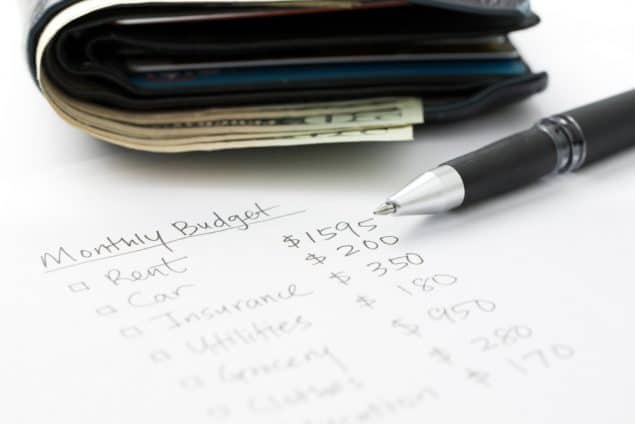Do you have a low income but want to save money? Learn how to budget when you have low income with these tips below.

Many families live on a low or fixed income rate. This can make it exceptionally difficult to save money or spend wisely! It seems every time your funds arrive, it’s time to put them all out towards bills.
If you’re living on low income and want to find a way to budget properly, then continue reading to learn more about how you can budget when you have low income.
How to Budget When You Have Low Income
Review Expenses and Income
Your first step to budgeting on a low income is to figure out what you have coming into the home for income and what’s going out for expenses.
Evaluate all of your spending habits and subtract that from your net household income.
This will give you a general idea of where you can cut costs, and how much money you have left after spending on the major bills and needs for your household.
Keep Housing Costs Under Control
It’s easy to say keep housing costs under control when the cost of renting is increasing, while the chances of buying are going down.
Whether you rent or own, it’s important to do your best to keep housing costs under control. Consider ways to be more efficient with your energy bill, heating bill, and other utilities since you can’t exactly adjust your household rent or mortgage payment.
The general rule of thumb is to keep your household expenses at no more than 35% of your income.
7 Ways to Save on Home Heating this Winter
Get and Stay out of Debt
Living on a low income is hard enough, but having debt on top of it is is even harder. That’s why you must focus on getting and staying out of debt.
Focus on one old debt at a time and work to pay that off. This will help free up some of your funds and allow you to be able to budget your low income easier.
Print out all of your debt and rank it from most important to least important, start choosing one debt at a time and toss money at it any chance you can to lower your debt to income ratio.
7 Ways to Build an Emergency Fund
Stop Eating Out
It may be convenient to order take out or delivery, but dining out is going to cost you a lot more than buying a quick meal you can cook at home.
Try to cut all spending on eating out and go grocery shopping once a week to keep your overspending on food options under control.
You can enjoy eating out later on when you get your low income budget under control.
Get a Handle on Grocery Shopping
Now that you’ve decided to stop eating out, you must get a handle on your grocery shopping expenditures.
Sit down and evaluate how much you’ve spent on groceries for the last three months. Evaluate what you’ve been buying and how long that food supply has lasted you.
Determine a good, solid grocery shopping budget by figuring out what you need to buy weekly and where you can buy these items for a lower cost. Don’t forget to use coupons!
How to Stock Your Pantry on a Budget
Establish a Zero-Sum Budget
The most important and probably most difficult part of budgeting when you have low income is to learn that you’ll have to establish a zero-sum budget.
This means you’ll already have your weekly income set aside towards the various bills and needs for the household. You won’t have any extra money lying around to spend frivolously.
This will take a lot of motivation and self-preservation to not spend money on unnecessary items, but you can do it.
These are just some of my tips I have to help you learn how to budget when you have low income.
Low income happens to many of us, whether it’s a new circumstance or simply a way of life that you’re going to have to deal with, living on a low income doesn’t have to be stressful.
Use my tips to start budgeting your low income today so that you can slowly start to climb up towards financial stability!
Leave a Reply